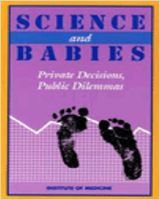NCBI Bookshelf. A service of the National Library of Medicine, National Institutes of Health.
By all indicators, the reproductive health of Americans has been deteriorating since 1980. Our nation is troubled by rates of teen pregnancies and newborn deaths that are worse than almost all others in the Western world.
Science and Babies is a straightforward presentation of the major reproductive issues we face that suggests answers for the public.
The book discusses how the clash of opinions on sex and family planning prevents us from making a national commitment to reproductive health; why people in the United States have fewer contraceptive choices than those in many other countries; what we need to do to improve social and medical services for teens and people living in poverty; how couples should "shop" for a fertility service and make consumer-wise decisions; and what we can expect in the future--featuring interesting accounts of potential scientific advances.
Contents
- Preface
- 1. Reproductive Health Issues
- 2. Infertility
- How Common is Infertility?
- The Process of Human Reproduction
- When the System Doesn't Work
- Seeking the Cause
- Damage to the Reproductive Tract
- Ovulation Disorders
- Endometriosis
- Causes of Male Infertility
- Medical Therapies for Women and Men
- Surgical Treatment for Varicocele
- Surgical Treatment for Women
- Artificial Insemination
- New Fertilization Procedures
- Protecting the Consumer
- IVF Clinics—the Current Scene
- Research Needs
- Conclusion
- Acknowledgments
- References
- 3. Contraception: Having a Healthy Baby at the Right Time
- 4. The Dilemma of Teenage Parenthood
- 5. Prenatal Care: Having Healthy Babies
- Maternal and Infant Health—The Picture Today
- Low Birthweight and Infant Mortality
- Poverty and Infant Mortality
- The Effects of Low Birthweight
- Preventing Low Birthweight: The Role of Prenatal Care
- Cost-Effectiveness of Prenatal Care
- Who Isn't Getting Enough Prenatal Care?
- Obstacles to Prenatal Care
- The Cost of Malpractice Insurance
- Research Needs
- Conclusion
- Acknowledgment
- References
- 6. Progress in Research
- 7. New Technologies: The Ethical and Social Issues
- 8. Areas for Policy Development
- Acknowledgments
This project was supported by a grant from the R. W. Johnson Pharmaceutical Research Institute, formed in a recent reorganization of the research and development divisions of Ortho Pharmaceutical Corp., Ortho Biotech, McNeil Pharmaceutical, and Cilag International.
This publication is based on presentations at the annual meeting of the Institute of Medicine held in Washington, D.C., on October 19, 1988. The views expressed are those of the participants and do not necessarily reflect those of the Institute of Medicine.
The Institute of Medicine was chartered in 1970 by the National Academy of Sciences to enlist distinguished members of appropriate professions in the examination of policy matters pertaining to the health of the public. In this, the Institute acts both under the Academy's 1863 congressional charter responsibility to be an adviser to the federal government and its own initiative in identifying issues of medical care, research, and education.
- NLM CatalogRelated NLM Catalog Entries
- What the United States can learn about prevention of teenage pregnancy from other developed countries.[SIECUS Rep. 1985]What the United States can learn about prevention of teenage pregnancy from other developed countries.Dryfoos J. SIECUS Rep. 1985 Nov; 14(2):1-7.
- Family planning services in the United States.[Bull Pan Am Health Organ. 1975]Family planning services in the United States.Morris L. Bull Pan Am Health Organ. 1975; 9(2):124-8.
- U.S. teen pregnancy: studies point to new prevention approaches.[Netw Res Triangle Park N C. 1988]U.S. teen pregnancy: studies point to new prevention approaches.. Netw Res Triangle Park N C. 1988 Fall; 10(1):10.
- Review Sex education. The dissemination of family planning services and contraceptives in public school.[J Leg Med. 1987]Review Sex education. The dissemination of family planning services and contraceptives in public school.Schoemaker D. J Leg Med. 1987 Dec; 8(4):587-611.
- Review Psychosexual issues in adolescent contraception.[Public Health Rev. 1982]Review Psychosexual issues in adolescent contraception.Greer JG. Public Health Rev. 1982 Jan-Mar; 10(1):27-47.
- Science and BabiesScience and Babies
Your browsing activity is empty.
Activity recording is turned off.
See more...
